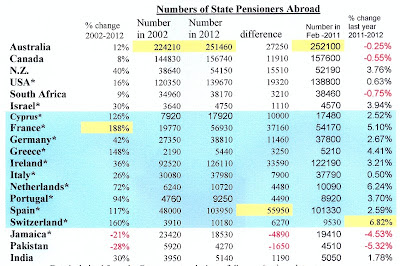British Pensioners in Europe
and beyond – An Analysis.
The emigration of pensioners to Europe
and beyond.
Of the 12,955,300 Citizens who
receive the UK State Pension, by 2015 - 1,230,390 live outside the UK. That is 9.5%.
QUESTIONS………………….
- Why do the pensioners emigrate?
- Why has the numbers generally flattened off since 2011?
- Is this emigration of advantage or not to the British Economy?
- What are the advantages or disadvantages to the pensioners in emigrating?
- Why have the numbers in Pakistan and Jamaica fallen so much?
- And why have they fallen in Australia and Canada and South Africa? - And Italy?
- Why have the numbers risen so much in N.Z., Ireland and France between 2008 - 2014? Why the increase to India – a frozen pension country?
Suggestions
for the answers –
derived from anecdotal evidence.
1. Why do the pensioners emigrate?
It varies –
Often the housing costs are considerably cheaper. (Much of Europe,)
Some are joining children who have previously emigrated. (Australia, Canada)
Some are returning to the land of their birth. (India? Jamaica? Ireland? )
Summer weather/climate is drier and
warmer (Much of Europe)
The countries of retirement are English Speaking (Ireland, N.Z. etc)
There is more space and a less hectic way of life (Much of
Europe).
The desire for new adventure while there is still time
--
Exposure to a different culture ,and, learning a new
language, broadening experience
Some dislike of changes in the UK, especially any which restrict
their lives.
2. Why has
the numbers generally flattened off since 2011?
The threatening approach of a possible Brexit? (All Europe curves). The Times journal 29/03/16 reports that ‘a hundred a day are
returning to the UK from Spain’.
See also Italy q.7 below. Austerity?
Remembering that everyone has a certain life-span. The increase in numbers represents additions
minus deaths. It is likely that a
ceiling in the curve of those emigrating would be reached. However note the
countries where the %’s fall.
Further a slight addition could be of those who have achieved pensionable age whilst living abroad.
Further a slight addition could be of those who have achieved pensionable age whilst living abroad.
3. Is this emigration of advantage or not to the
British Economy?
.Positive - The
pensioners do not use the physical facilities of the NHS, even though those in Europe get some payment of their medical
care. Those far from Europe get no support.
They free up some housing stock.
They do not use the free bus passes and TV licences which
saves money.
Many have UK based investments, benefiting the
economy, and could and would do so more if the UK Government made it
easier.
Negative – Their pensions are not all spent in the UK economy.
4. What are
the advantages or disadvantages to the pensioners in emigrating?
Positive – as listed generally in answer to 1.
Negative – Lack of any voice at all at the political level –
leading to no voice in the manner and use of UK investments.
A feeling of almost total neglect or lack of interest in
them by the British Government.
In certain countries the pension falls in value year by year
as it is frozen.
5. Why have
the numbers in Pakistan and Jamaica fallen so much?
Possibly the standard of living and Governance of these
countries is a problem. Pakistan also has a frozen pension regime.
6. And why
have they fallen in Australia and Canada and South Africa?.
The freezing of the State pension is a very likely cause.
And Italy?
Uncertain – The fears of a Brexit seem most likely.
7. Why have
the numbers risen so much in N.Z., Ireland and France between 2008-2014?
N.Z. provides pensions which supplement the frozen UK pension and it is a very ‘English’
country.
Ireland is almost certainly the birth-land
or ancestral land of many UK State pensioners. It has more space and in many
ways is so similar to England.
France is adjacent to England and there is easy access to family
and friends, within a short time travel.
India has a steadily rising economy, but
is at present an economical country. It has little religious friction, and
would be attractive to retiring ‘British’ Indians, who have done well in the UK.
Postscript
– It can be argued that it is in the
interest of the British economy to encourage the pensioners to retire abroad
(q.v. 3 above). It is unfortunate that
the Government puts difficulties in their way with regard to investing in
British enterprises, and financial institutions. Many (especially in the EU)
buy goods from the UK.
The figures
are all derived from published Government Statistics on the State pension.





